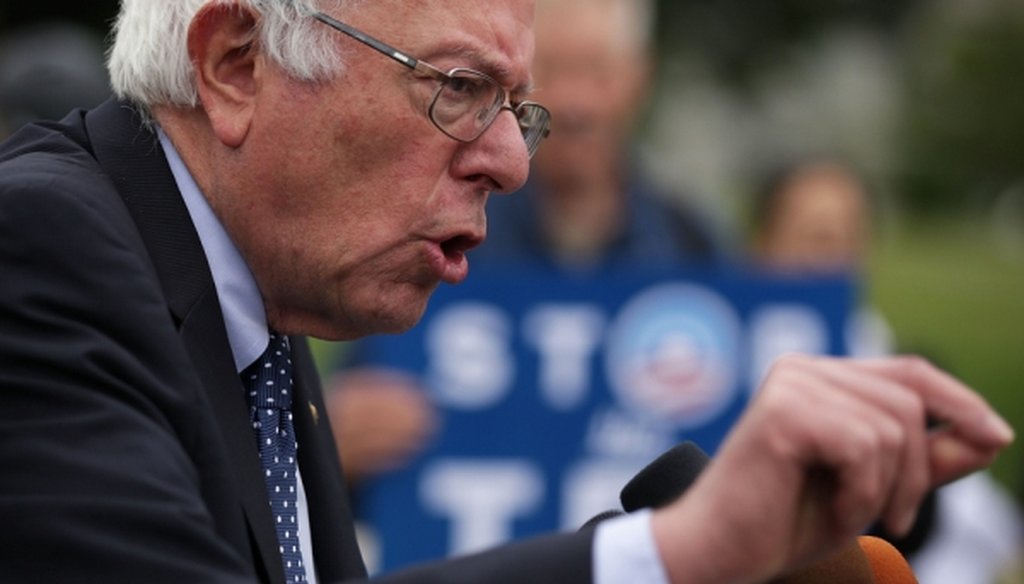

Our only agenda is to publish the truth so you can be an informed participant in democracy.
We need your help.


Democratic presidential candidate Bernie Sanders speaks during a news conference on Capitol Hill on June 3, 2015.
Several 2016 presidential candidates in both parties have discussed how the criminal justice system might be improved. The latest to address this issue was Democratic presidential candidate Bernie Sanders during a June 11, 2015, interview on PBS.
"A black male baby born today, if we do not change the system, stands a one-in-three chance (of) ending up in jail. This is (an) unspeakable tragedy."
When we took a closer look, we found that the statistic may not be far off -- but it’s hard to know for sure, because the data Sanders relies on is so old. As with other dramatic talking points we’ve seen over the years, this one has been repeated and repeated over a decade and a half without being updated, despite evidence that the underlying trends have changed direction.
The statistic dates back to a 2003 paper published by the Bureau of Justice Statistics, a division of the U.S. Justice Department. The Bureau of Justice Statistics paper includes the line, "About 1 in 3 black males ... are expected to go to prison during their lifetime, if current incarceration rates remain unchanged."
By contrast, the paper said, one of every six Hispanic males and one of every 17 white males can be expected to go to prison during their lifetime. (For this fact-check, we’ll ignore Sanders’ imprecise use of "jail," where people are held temporarily, rather than "prison," where inmates are typically serving substantial sentences.)
Not only was this data published 12 years ago, but the paper is based on data from 2001 -- a full 14 years ago. Despite its age, the statistic has been cited repeatedly -- notably in 2013 with the publication of a report by the Sentencing Project, a group that advocates for prison reform and promotes alternatives to incarceration. That report’s claim -- that "if current trends continue, one of every three black American males born today can expect to go to prison in his lifetime" -- was footnoted to a 2011 paper by Marc Mauer, the Sentencing Project’s executive director.
When we contacted Mauer, he said he doesn’t know of any updated research that would shed light on the percentage today. "It's a very complex analysis to produce, so that's at least part of the reason that it hasn't been replicated in recent years," Mauer said.
We did, however, find reason to believe that the trend line that had been assumed in the 2003 paper has changed course.
According to annual Justice Department reports, in 2001 there were 3,535 sentenced black male prisoners under state or federal jurisdiction for every 100,000 black male residents. By 2013, the equivalent number was 2,805. So black incarceration rates were 21 percent lower in 2013 than they were in 2001.
That said, there’s little doubt that black men have disproportionately higher incarceration rates. For instance, a study published in the journal Crime & Delinquency found that nearly half of black males and almost 40 percent of white males in the United States have been arrested by the age of 23.
But because of the complexities of modeling the statistics, Mauer said, it’s hard to know how much the decline in incarceration rates would specifically change the one-in-three statistic Sanders used.
"We can't necessarily say that the one-in-three figure should be reduced by 21 percent, although if we did, it would bring it down to about 1 in 4, which is still quite dramatic," Mauer said.
Our ruling
Sanders said that "a black male baby born today, if we do not change the system, stands a one-in-three chance (of) ending up in jail."
This calculation, while it’s the most recent one available, is 14 years old, and changes in the underlying data suggest that the actual odds of incarceration may be somewhat smaller today. Still, other evidence suggests that blacks have a disproportionate likelihood of ending up in prison. On balance we rate it Mostly True.
Bernie Sanders, interview on PBS, June 11, 2015
Bureau of Justice Statistics, "Prevalence of Imprisonment in the U.S. Population, 1974-2001," August 2003
Bureau of Justice Statistics, "Prisoners in 2001," July 2002
Bureau of Justice Statistics, "Prisoners in 2013," September 2014
Marc Mauer, "Addressing Racial Disparities in Incarceration," Aug. 25, 2011
Sentencing Project, "Report of The Sentencing Project to the United Nations Human Rights Committee Regarding Racial Disparities in the United States Criminal Justice System," August 2013
CBS News, "Study: 49% black men, 38% white men arrested by age 23," Jan. 8, 2014
Email interview with Marc Mauer, executive director of the Sentencing Project, June 12, 2015
Email interview with Jeff Frank, spokesman for Bernie Sanders, June 12, 2015
In a world of wild talk and fake news, help us stand up for the facts.
